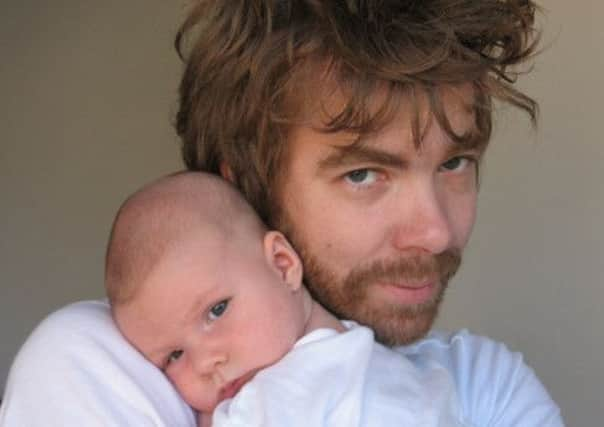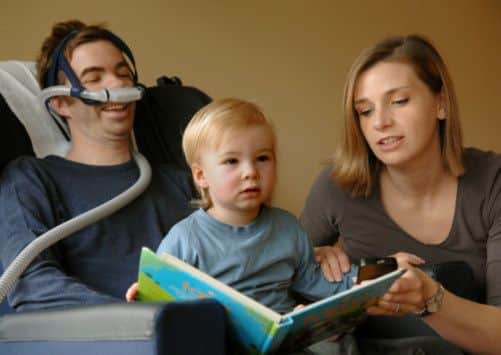Neil’s determination to tell his story as a cruel disease took its pitiless course


Just two months after he was diagnosed as suffering from Motor Neurone Disease (MND), Neil Platt helped his younger brother Matthew to choose a new flat.
Struggling with freedom after the end of a long-term relationship, Matthew turned to his older brother for advice and assistance. Neil helped – as he always did. And when the time came to view the new flat, Neil went along.
Advertisement
Hide AdAdvertisement
Hide Ad“He was already struggling to walk,” recalls Matthew. “I had to carry him up the stairs on my back to view the flat. He was still really involved in organising people and making sure they were set for when he wasn’t around. He loved getting people sorted. That was kind of who he was.”


Neil Platt was a systematic, logical, organised man from Tingley, near Morley. Aged 33 he was a successful architect in London with a wife and newborn son. Things couldn’t have been better. Then, one day, he noticed he couldn’t lift his right foot properly. It seemed to drag on the ground.
Wife Louise thought he needed new shoes. Neil’s thoughts were darker. His father and grandfather had died of Motor Neurone Disease, a condition that attacks the neurones that send messages from the brain to the muscles. He rightly feared that the problem with his foot was a harbinger of worse to come.
Over the next year Neil’s condition deteriorated as his body crumbled. MND is a pitiless, cruel disease that robs its sufferer of the ability to walk, move, swallow and speak. It strikes without warning and is brutal in its speed. There is no cure.
Advertisement
Hide AdAdvertisement
Hide AdNeil’s battle with MND, his mindset, his determination to be a father to baby Oscar and a husband for as long as possible and, inevitably, his frustrations and anger, are portrayed in I Am Breathing, a documentary he conceived and encouraged to raise awareness about the condition.
The film has already played at festivals in Europe. The Hollywood Reporter called it “powerfully harrowing” and that it “ranks amongst the year’s most moving films”. Before the film came Neil’s blog, which he called Plattitude. It chronicled his day-to-day experiences with the condition that killed his grandfather, George, at 62, and later his father, David, at 51.
At first Neil, who moved with his family to Harrogate following the diagnosis, wrote the entries himself. Later, as his muscles and limbs failed him he dictated his thoughts to Louise. He continued the blog in irregular fashion until the day before he died.
Elements of it are scattered throughout I Am Breathing. They underline the spirit of a man who, sadly, knew from past experience that his condition was terminal.
Advertisement
Hide AdAdvertisement
Hide AdOne said: “I do spend a lot of time thinking about Oscar and the questions he may one day have wanted to ask me. How do I anticipate things he would find useful to know about me in a life 15, 20 years from now?”
Thus he created a memory box packed with cherished things. A leather jacket. A guitar. Flat cap. Cuff links. Physical memories of a life cruelly cut short. For Neil living with MND meant revisiting the trauma of watching his own father die. But it also allowed him to plan his own death, which he did with precision. More importantly, the film represented a goodbye letter to his infant son.
“It was something we’d never discussed: the chance of the condition ever creeping up on us, albeit we both knew exactly what the probabilities were,” says Matthew. “It was never brought to the forefront. I have always said that I couldn’t have lived through it like he did or like my father did. His character was very steely.”
Matthew believes his youth, the birth of his son and his recent marriage contributed to his approach. “His fight to want to last as long as possible was borne out of that. I was very surprised at how brave he was.”
Advertisement
Hide AdAdvertisement
Hide AdThere are four main strains of MND and the average period of illness and deterioration is about four years. However the strain affecting the Platt family is fast acting. Grandfather George had two years. Father David and son Neil had approximately 12 months.
“Having seen how quick it was with Dad and given how quick it spread from one limb to the next you could see how quick it was going to be,” says Matthew. “Neil was very aware of that fact, as well, from conversations I had with him after he had been diagnosed and throughout his illness. I think that’s the thing: you know better than anybody how you feel. I don’t think even the doctors could have gauged it better than Neil could.”
Neil’s analytical, problem-solving nature allowed him to lay the groundwork for life after his death. He endured the surreal experience of organising his own funeral. Later, as he neared the end, he encouraged Louise to house hunt in Scotland to locate a new home for her and their son after his death.
“Because he couldn’t do much physically all he had was his brain, his speech and his thoughts to put back into his family, his friends and his wife,” recalls Matthew.
Advertisement
Hide AdAdvertisement
Hide Ad“That was the only way he could input into everyday existence. He was still the leader with all the ideas of how things should be done and when it should be done by.
“He was very good at it but as I’m sure will be evident from the blog and from the film sometimes it pushed people’s buttons!
“He felt like he needed to have some level of control, which is totally understandable, being in his position. He was doing it to protect Louise and Oscar – to make sure there was as much sorted out for the people you were leaving behind.”
I Am Breathing is a remarkable record of a remarkable man. Those who have seen the film at its foreign festival screenings have remarked at the extraordinary ordinariness of Neil Platt. Of his mordant wit, his compassion, his sense of responsibility to the son he would never see grow, and his love and devotion for the young wife who became nurse and carer.
Advertisement
Hide AdAdvertisement
Hide AdWhile shot through with humour, it doesn’t shy away from the heartache and shows Neil breathing through a noisy ventilator, wistfully looking through a window as his friend plays with young Oscar.
“It was heartbreaking for him to see other people playing with his son when he couldn’t even hug him,” says Emma Davie, co-director of the film.
“But Neil wanted the film to be made. He was so scared his son would get MND and he wanted more people to hear about it and for there to be more research.
“He did suffer – it was a huge struggle for him, but he was a great spokesperson for the disease. Towards the end, one of the few things he had left was that he could talk, and he was determined to use that ability to get the word out about MND.”
Advertisement
Hide AdAdvertisement
Hide AdNeil made a living will stating that when he lost the ability to communicate and swallow, he wanted his ventilator switched off at the hospice. The documentary team didn’t feel it was appropriate to be present at the final stage, but a cousin filmed him as he lay in bed struggling to tell Louise, as she wiped away her tears, that he’d made the brave decision that the time had come.
In his blog he confessed: “The thought that the end is nearing fills me with dread.”
Matthew Platt is proud of his brother and of the decision he took to document his last days. The film, he says, is less about the man than the disease that kills more people than AIDS but is woefully underfunded.
MND is diagnosed in around 1,000 people every year and around 5,000 people have the disease at any one time. However, while more than £300m is spent annually on cancer research in this country, the average annual spending on MND research is just £2m.
Advertisement
Hide AdAdvertisement
Hide Ad“It’s not able to be diagnosed. It can’t be treated. We know nothing about [it] and we really cannot treat it. MND is like the last condition,” says Matthew. “It’s such an unknown. There’s not enough money injected into MND and that has to change. That’s what Neil wanted.”
I Am Breathing will be screened internationally on Friday, MND Global Awareness Day which will launch the UK cinema release. Find out how to support and set up your own screening through www.iambreathing.com
‘Don’t let your time slip by’
Sally Light, chief executive of the MND Association, says initial symptoms vary from person to person and most are not usually noticeable until they’ve had the illness for some time. Research is being done to look for markers in spinal fluid that could help detect and treat MND much earlier.
The majority of people with MND retain their cognitive ability, and this, says Light, is one of the most distressing things about it.
Advertisement
Hide AdAdvertisement
Hide AdSumming up his thoughts in one of the most poignant blogs, Neil himself wrote: “My re-acquaintance with the when of things has confirmed how right I was to value my time.
“You could all do me a favour – don’t let yours slip by unnoticed.”